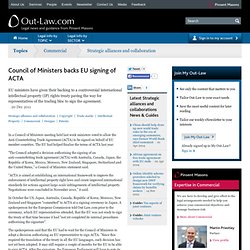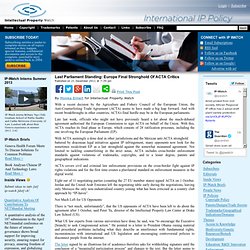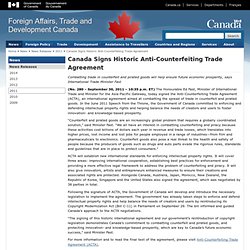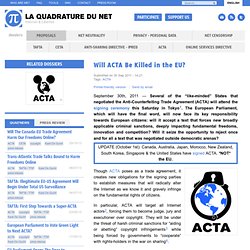

Council of Ministers backs EU signing of ACTA. In a Council of Ministers meeting held last week ministers voted to allow the Anti-Counterfeiting Trade Agreement (ACTA) to be signed on behalf of EU member countries.

The EU had helped finalise the terms of ACTA last year. "The Council adopted a decision authorising the signing of an anti-counterfeiting trade agreement (ACTA) with Australia, Canada, Japan, the Republic of Korea, Mexico, Morocco, New Zealand, Singapore, Switzerland and the United States," a Council of Ministers statement said. "ACTA is aimed at establishing an international framework to improve the enforcement of intellectual property right laws and create improved international standards for actions against large-scale infringements of intellectual property.
Negotiations were concluded in November 2010," it said. In October the US, Japan, Australia, Canada, Republic of Korea, Morocco, New Zealand and Singapore "committed" to ACTA at a signing ceremony in Japan. Last Parliament Standing: Europe Final Stronghold Of ACTA Critics. With a recent decision by the Agriculture and Fishery Council of the European Union, the Anti-Counterfeiting Trade Agreement (ACTA) seems to have made a big leap forward.

And with recent breakthroughs in other countries, ACTA’s final hurdle may be in the European parliaments. Late last week, officials who might not have previously heard a lot about the much-debated agreement authorised the European Commission to sign ACTA on behalf of the Union. With this, ACTA reaches its final phase in Europe, which consists of 28 ratification processes, including the one involving the European Parliament (EP). With ACTA seemingly a done deal in other jurisdictions and the Mexican anti-ACTA stronghold battered by draconian legal initiatives against IP infringement, many opponents now look for the sometimes recalcitrant EP as a last stronghold against the somewhat misnamed agreement.
Eight out of 11 negotiating parties (counting the 27 EU member states) signed ACTA on 1 October. Canada Signs Historic Anti-Counterfeiting Trade Agreement. Combatting trade in counterfeit and pirated goods will help ensure future economic prosperity, says International Trade Minister Fast (No. 280 – September 30, 2011 – 10:35 p.m.

ET) The Honourable Ed Fast, Minister of International Trade and Minister for the Asia-Pacific Gateway, today signed the Anti-Counterfeiting Trade Agreement (ACTA), an international agreement aimed at combatting the spread of trade in counterfeit and pirated goods. In the June 2011 Speech from the Throne, the Government of Canada committed to enforcing and defending intellectual property rights and helping balance the needs of creators and users to foster innovation- and knowledge-based prosperity. “Counterfeit and pirated goods are an increasingly global problem that requires a globally coordinated solution,” said Minister Fast. ACTA will establish new international standards for enforcing intellectual property rights.
A backgrounder follows. For further information, media representatives may contact: Date Modified: ACTA signed – EU deaf-mute. Will ACTA Be Killed in the EU? September 30th, 2011 — Several of the “like-minded” States that negotiated the Anti-Counterfeiting Trade Agreement (ACTA) will attend the signing ceremony this Saturday in Tokyo1.

The European Parliament, which will have the final word, will now face its key responsibility towards European citizens: will it accept a text that forces new broadly applicable criminal sanctions, deeply impacting fundamental freedoms, innovation and competition? Will it seize the opportunity to reject once and for all a text that was negotiated outside democratic arenas? UPDATE (October 1st): Canada, Australia, Japan, Morocco, New Zealand, South Korea, Singapore & the United States have signed ACTA. *NOT* the EU. Though ACTA poses as a trade agreement, it creates new obligations for the signing parties to establish measures that will radically alter the Internet as we know it and gravely infringe on the fundamental rights of citizens. 1.